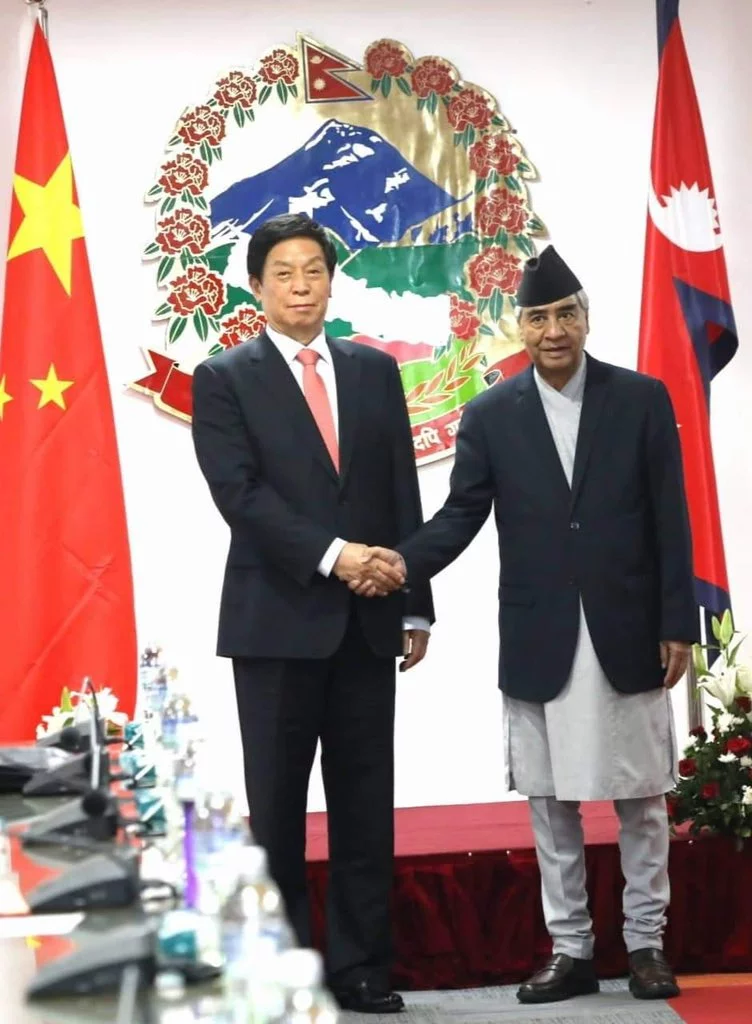

China's top legislator Li Zhanshu calls upon Nepal's Prime Minister Sher Bahadur Deuba on Tuesday in Kathmandu
In a bid to cultivate ties with Nepal’s parliament, China’s top legislator Li Zhanshu signed an agreement with Agni Prasad Sapkota, speaker of the House of Representatives, the lower house of parliament, on Monday.
Li and his Nepali counterpart Sapkota inked the six-point Memorandum of Understanding (MoU) following their hour-long delegation-level talks at the Federal Parliament Building, New Baneshwar.
According to the text of the agreement shared to media, Nepal and China’s legislatures will intensify their engagements and exchanges on governance, legislative and supervisory practices under the framework of the China-initiated Belt and Road Initiatives (BRI).
“The two sides also agreed to enhance cooperation under the Belt and Road Initiative as per the understanding reached between the two governments in the past,” read the text of the agreement.
This is for the first time, legislatures of Nepal and China signed the formal agreement to enhance cooperation. Earlier, parliamentarians of the both the countries had normal interactions, including exchange of visits for the past few years.
The agreement seeks to build goodwill and mutual trust between the two legislatures and respect sovereignty, territorial integrity, independence and development path and matters of common concern.
China has, of late, stepped up its engagements with the entire political spectrum of Nepal. Li’s visit is one of the high-level visits from China to Nepal in recent months. The focus of the current visit is to cultivate ties with parliamentarians also partly due to geopolitical reasons, observers said.
“The Chinese could have realized the importance of Nepal’s parliamentary exercise following the passage of the Millennium Challenge Corporation Nepal Compact, a $500 million US grant agreement, Rupak Sapkota, a China watcher said in a recent interview with the Kathmandu Post newspaper, adding “Perhaps that was an added motivation to push for greater engagement with Nepali parliamentarians.”
In February this year, Nepal’s parliament passed the US—initiated MCC Nepal Compact, despite China’s public displeasure. China and the US also engaged in war of words over the MCC Nepal Compact accusing each other of violating Nepal’s sovereign decision.
China’s Ministry of Foreign Affairs accused the US of employing coercive diplomacy against Nepal while the US countered that it was China who was behind the delay in passing the US grant program MCC.
In whirlwind visit, Li meets Nepal’s PM, political leaders
Li, the chairman of China’s National People’s Congress Standing Committee, who arrived in Nepal’s capital Kathmandu on Monday afternoon on a four-day visit, is holding a series of high-level meetings.
Li, the third-ranked leader in China’s political hierarchy, held separate meetings with Nepali Prime Minister Sher Bahadur Deuba, Foreign Minister Narayan Khadka and National Assembly Chairman Ganesh Prasad Timalsina, on Tuesday.
The two sides discussed a number of bilateral issues including bilateral trade, investment, connectivity, return of Nepali students to China, resumption of passenger flights, and reopening of border ports, according to a statement issued by Nepal’s foreign ministry.
“The Chinese side appreciated Nepal for its stand on One China policy and its commitment not to allow the Nepali territory to be used against the core interests of China,” the ministry said.
On Tuesday, the Chinese leader also met chairman of the CPN (Maoist Center) Pushpa Kamal Dahal alias Prachanda and CPN (Unified Marxist Leninist) chairman KP Sharma Oli in a bid to see the possibility of alliance among the communist forces in Nepal in the post-election scenario. The Chinese have a soft corner for Nepal’s communist forces and they have been encouraging them to come together and forge an alliance. However, its hopes have been dashed following the vertical split of the then Nepal Communist Party (NCP) in March 2021 due to a bitter factional feud.
In meeting with Prachanda, the Chinese leader sought help to execute connectivity projects under the Belt and Road framework proposed by China, Ramesh Malla, an aide to Prachanda said.
Li is visiting Kathmandu at the invitation of Nepal’s parliament speaker Sapkota. Sapkota is also former leader of the Communist Party of Nepal (Maoist Center) led by Pushpa Kamal Dahal alias Prachanda. On Monday afternoon, Li and his Nepali counterpart Sapkota held delegation-level talks at the Federal Parliament Building in which the two sides agreed to enhance parliamentary exchanges.
Li’s stopover in Nepal is part of his four-nation tour that includes Russia, Mongolia, Nepal and South Korea.
Li, the leader of the 67-member visiting Chinese delegation, is also part of the big-seven, headed by the General Secretary of the Communist Party of China (CPC), who comprise the standing committee of the 25-member Politburo.
He is the third Chinese leader to visit Nepal this year. In the second week of June, Head of the Chinese Communist Party (CCP) international department, Liu Jiancho, visited Nepal and gave a message that China wants to enhance ties with all the political parties including the chief ruling party Nepali Congress, which has maintained a close ties with the United States in the recent years.
Prior to that, in the last week of March, China’s foreign minister and state councilor Wang Yi came to Nepal.
Also Read: Top US official arriving in Nepal on Thursday amid growing US – China rivalry
Family members of leading Baloch activist and Baloch Yakjehti Committee (BYC) leader, Sammi Deen Baloch…
Chile President Gabriel Boric, who is on a State visit to India, has expressed keen…
The French Embassy in India said on Monday that as France assumes the monthly presidency…
BNP-M President Sardar Akhtar Mengal said on Monday that his party's sit-in demanding the release…
Prime Minister Narendra Modi on Tuesday jointly addressed the press with Chile President Gabriel Boric…
INSV Tarini, part of the Navika Sagar Parikrama II expedition, arrived in Cape Town, South…